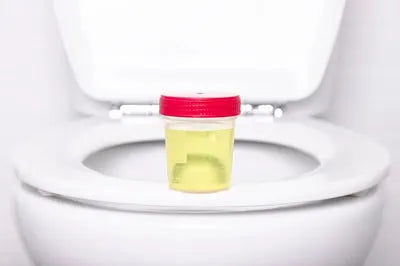Before we start, Aditya Narayan, a general store owner from Tamil Nadu, has something to say to everyone who came looking for this blog:
“If you’re still keeping quiet about your condition without asking for help, then please don’t do it. I’ve been wearing diapers for more than 6 years now and it is not something that you should be afraid of. They are made to make your life easier. If you are having leaking issues, you need to see a doctor and don’t worry, they will not announce your condition to everyone! My condition cannot be treated, but there is a good chance yours is treatable. Incontinence is a big problem, otherwise why would companies make products to help with urine leakage? I sell adult diapers in my store myself and a lot of other general shops have also started doing the same.”
Most people believe bedwetting is something that only happens to kids, but it’s a problem that can hit grown-ups too. Experts believe the numbers might be way more than on records because adults are embarrassed and unwilling to talk with their doctors about their condition.
In this blog, we take a look at adult bed wetting -or nocturnal enuresis, or nocturia as it’s scientifically called – along with its symptoms, possible causes, treatment options, and recommendations for managing it.
What is adult bed wetting?
It’s normal to wake up once or twice during the night to go to the toilet. The urge to urinate usually wakes up the sleeping person. However, some people don’t wake up and end up wetting their bed. This is called nocturnal enuresis.
What are the types of nocturnal enuresis?
There are two main types of nocturnal enuresis in adults:
Primary nocturnal enuresis: Occurs when a person has been continually wetting their bed for six months in a row or longer.
Secondary nocturnal enuresis: Occurs when a person wets their bed again after not wetting the bed for six months or more. Secondary nocturnal enuresis is usually the result of a medical or psychological condition.
What are the causes of bedwetting in adults?

Based on studies, there are several factors that can contribute to the development of nocturnal enuresis. Below is a list of adult bedwetting causes and risk factors that have been linked to nocturnal enuresis:
1. Genetics
People are more likely to develop nocturnal enuresis if they have a family history of bedwetting problems.
2. Sleep Apnoea
Sleep apnoea, a sleep disorder, causes a person’s breathing to stop briefly while they sleep. These breathing interruptions cause a drop in oxygen levels, which can affect normal bladder functions and be one of the adult bedwetting causes.
3. Hormonal Changes
Hormonal imbalances, such as changes in antidiuretic hormone (ADH) levels, which regulate urine production, can contribute to bed wetting in adults. Normal levels of ADH at night-time signal the kidneys to decrease the production of urine. But an imbalance of ADH can lead to increased production of urine and ultimately result in becoming one of the adult bedwetting causes.
4. Small Bladder
A small bladder doesn’t mean a bladder smaller than what’s considered normal. Instead, it feels fuller quickly than normal, meaning it functions as if it’s a smaller bladder.
5. Overactive Bladder
It is estimated that almost 7-8 adults in 10 who experience bedwetting likely have an overactive bladder at night. Overactive bladder is a condition in which the bladder muscles contract involuntarily, even when the bladder is not full yet, which can lead to a sudden and strong urge to urinate that can be difficult to control and usually ends with unavoidable and sudden bedwetting in adults.
6. Aging
As people age, the muscles of the bladder and pelvic floor may weaken, reducing bladder capacity and control, and increasing the risk of bedwetting.
7. Diabetes
Unchecked or poorly controlled diabetes can cause excessive production of urine. This can be one of the adult bedwetting causes.
8. Lifestyle factors
Some daily lifestyle habits have the potential to affect your bladder or your daily sleeping pattern, which could, in turn, cause nocturnal enuresis. Some important and common lifestyle factors include:
- Excessive alcohol consumption: Those who consume alcohol tend to go into a deep sleep and will not be woken up by an urge to urinate during their sleep. Alcohol is also a bladder irritant which can cause frequent urge to urinate.
- Mental stress: Increased stress, social difficulties, anxiety, and trauma may interfere with normal sleep pattern and cause bedwetting.
- Medications: Certain medications can cause a rapid increase in urine production and sometimes lead to bedwetting at night.
- Fluid intake: Excessive fluid intake at night or near bedtime might be the reason you’re experiencing bedwetting issues.
Some other conditions
Some other conditions that can lead to nocturnal enuresis include:
- Bladder and kidney stones
- Obesity
- Enlarged prostate or other prostate issues
- Urinary tract infections (UTIs)
- Sleep walking
How is bed wetting in adults diagnosed?
Since bedwetting can be a symptom of other underlying health conditions, such as diabetes and UTIs, it’s important to uncover the root cause of your nocturnal enuresis and get a proper diagnosis.
During your appointment with your doctor, you can expect:
-
Medical history review:
Your lifestyle habits, diet, medications you’re on, family history of bedwetting and other health conditions, or whether you’ve been recently diagnosed with any health condition such as enlarged prostate or diabetes, will all be reviewed by your doctor.
-
Physical examination:
Simple tests to see if you lose urine control during physical activities, such as coughing and laughing, to rule out certain types of urinary incontinence.
-
Urinalysis:
A urine sample will be taken to test for infection, blood, or other abnormalities in the urine.
Your doctor may also order additional tests to get a proper diagnosis, including:
-
Urine culture:
Your urine sample will be collected and sent to a lab and put in a special dish with nutrients, which helps diagnose a UTI.
-
Uroflowmetry:
You will be asked to pee into a special device that measures how much urine your body produces and how quickly your urine flows out.
-
Cystoscopy:
A thin tube with a camera at one end is inserted through your urethra and into your bladder to determine how much urine is left in your bladder after just urinating.
Your doctor may also order some more additional tests to accurately determine the cause behind your nocturnal enuresis.
Treatment for bed wetting in adults
Adult bed wetting treatments or nocturia treatments typically involve a combination of lifestyle changes, medications, behavioural therapies, and the use of incontinence products.
Establishing a regular toilet schedule: Setting a routine for regular bathroom breaks throughout the day, including before bedtime, can help train the bladder and reduce the likelihood of bedwetting.
1. Lifestyle changes
Lifestyle changes can play a significant role in managing bed wetting in adults. These may include:
- Limiting fluid intake before bedtime: Avoiding excessive fluids, particularly caffeine and alcohol, in the evening can help reduce the chances of bedwetting.
- Emptying the bladder before bedtime: Making sure to urinate before going to bed can help reduce the amount of urine in the bladder, potentially decreasing the risk of bedwetting.
2. Medications
Several medications may be used to treat bed wetting in adults, including:
- Antidiuretic drugs: These medications reduce urine production and can help prevent bedwetting by decreasing the amount of urine in the bladder during the night.
- Tricyclic antidepressants: These medications can help relax the bladder muscles and increase the bladder's capacity, reducing the frequency of bedwetting episodes.
- Mirabegron: This medication helps increase the bladder's capacity and can be used to treat bed wetting in adults with overactive bladder symptoms.
3. Behavioral therapies
Behavioral therapies can be effective in managing bed wetting in adults. These may include:
- Bladder training: This involves gradually increasing the time between bathroom breaks during the day to train the bladder to hold more urine and reduce the frequency of bedwetting at night.
- Kegel exercises: These exercises can help strengthen the pelvic floor muscles, which are responsible for controlling urine flow, and can be beneficial in managing bedwetting.
- Biofeedback: This therapy involves using electronic devices to provide feedback on bladder and muscle activity, helping individuals learn how to better control their bladder function.
4. Overnight Adult Diapers
Overnight diapers are specifically designed to last you through the night and provide a practical and effective solution to nocturnal enuresis. You don’t need to look any further than Friends Overnight Adult Diapers! Friends Overnight Adult Diapers:
- Provide up to 16 hours of protection from wetness and absorb leakage over 1.5 litres!
- Come with an odor lock technology and anti-bacterial core to prevent any urine smell or rashes and infections.
- Comes with a wetness indicator to let you know when it’s the time to change.
- Made with cloth-like breathable back sheet to keep your skin dry and free of any trapped moisture.
- Comes equipped with leak guards to prevent any side-trickles and spills.
- Available in pant-style and tape-style, each with their own unique perks.
Friends ke saath Azadi Mubarak!
How does bedwetting affect a person’s mental health?
Bedwetting can deeply impact one's mental health, but it's important to remember that you're not alone in this journey. Feeling embarrassed or ashamed is a common reaction, but it's crucial to recognise that bedwetting is often beyond your control. Understand that it's not a reflection of your character or maturity. Remember, just like diabetes, managing conditions like bedwetting may involve medication and treatment. There's absolutely no shame in seeking the help you need to live comfortably and confidently.
One significant effect is the toll it takes on self-esteem. Waking up to wet sheets can be disheartening, leading to feelings of inadequacy or embarrassment. However, it's essential to remind yourself that bedwetting is a medical issue, not a personal failing.
Moreover, the fear of judgment from others can be overwhelming. You may worry about sleepovers, sharing a room, or even dating. But opening up to understanding friends, family, or a healthcare provider can ease this burden. Remember, those who truly care about you will offer support and love.
Dealing with bedwetting requires patience and perseverance. Establishing a bedtime routine, limiting fluids before bed, and using protective bedding can help manage symptoms. Seeking medical advice is also crucial to address any underlying adult bedwetting causes.
Above all, be kind to yourself. Bedwetting is a challenge, but it doesn't define you. With understanding and support, you can navigate this journey towards better mental health and a good night's rest.
And if you need someone to talk to, we're here for you. You can reach out to Friends Adult Diapers in the comments or send us a message on our Facebook and Instagram pages. Help us support you in this journey. :)
Tips to Deal With Wetness
-
Stay Calm and Positive:
Recognise that adult bedwetting is a medical challenge, not a personal failing. It is not your fault. Be kind to yourself and cultivate a mindset of resilience and compassion as you navigate its management.
-
Consult a Healthcare Professional:
Seek guidance from a doctor to rule out any underlying medical issues causing bedwetting. They can offer tailored advice and treatment options.
-
Monitor Fluid Intake:
Limiting fluids before bedtime can help reduce the likelihood of bedwetting. However, ensure adequate hydration throughout the day.
-
Use Protective Bedding:
Invest in waterproof mattress covers and absorbent bedding to minimize discomfort and damage to your mattress. You can also use Friends Premium Underpads that comes with a crisscross design to prevent leakage or spills and ensure maximum absorption.
-
Establish a Bedtime Routine:
Establishing a consistent bedtime routine can help train your body to recognize when it's time to sleep and reduce nighttime accidents.
-
Practice Bladder Training:
Train your bladder by gradually increasing the time between bathroom breaks during the day. This can help improve bladder control over time.
-
Try Bedwetting Alarms:
Bedwetting alarms can help by alerting you when you begin to urinate, allowing you to wake up and use the bathroom. These alarms can be effective in training your body to recognize bladder signals during sleep.
-
Manage Stress:
Stress and anxiety can exacerbate bedwetting. Practice relaxation techniques, such as deep breathing or meditation, to reduce stress levels.
-
Seek Support:
Don't hesitate to reach out to support groups or online communities for guidance and emotional support. Sharing experiences with others facing similar challenges can be reassuring and empowering.
Wetting the bed as an adult may feel embarrassing and frustrating but remember that you are not alone. In fact, there’s no reason for you to be ashamed as it’s not your fault to begin with. Many people experience bladder control problems, whether due to aging or some medical condition. Fortunately, there are many treatment options and management strategies available to improve the quality of your life.
We’re always here to listen to your doubts, and queries and support you in managing your incontinence better. So don’t you worry! Leave your comments below and stay tuned for our next blog.
Product Recommendations
FAQS about Adult Bed Wetting
Is there a remedy to stop peeing on bed?
Yes, there are various remedies that can help you stop adult bedwetting:
- Lifestyle changes: Limit fluid intake before bedtime, pee before going to sleep, have a toilet schedule, practice good sleep hygiene.
- Behavioural therapies: Bladder training exercises, Kegel exercises for pelvic floor muscles, and biofeedback might be of help.
- Incontinence products: Use Friends Adult Diapers and Underpads to manage bedwetting better.
Is it normal for adults to wet the bed sometimes?
You might be surprised to learn that adults can wet their bed sometimes too. And it is not always due to an underlying condition. It can be caused by various factors, including medical conditions, ageing, psychological factors, and lifestyle habits. It’s important to consult a doctor for proper diagnosis to rule out underlying health conditions.
What causes adults to urinate in their sleep?
Adults may urinate in their sleep, or experience bedwetting, due to various reasons, including medical conditions such as urinary tract infections, bladder or prostate issues, diabetes, neurological conditions, and sleep disorders. Ageing can also weaken the muscles of the bladder and pelvic floor, increasing the risk of bedwetting. Psychological factors, such as emotional stress or psychological disorders, can also affect bladder control.
How do adults fix bed-wetting?
Managing bed wetting in adults may involve a combination of approaches, but it all depends on the underlying cause. Make lifestyle changes such as limiting fluids before bedtime, peeing before sleep, and having a regular toilet schedule. Behavioral therapies such as bladder training exercises, Kegel exercises, and biofeedback can be helpful. The most important, however, is to get yourself checked by a doctor.
What is the best home remedy for incontinence?
Some of the best home remedies that may help manage incontinence symptoms at home are:
- Bladder training: have a regular toilet schedule, gradually increase time between bathroom breaks.
- Kegel exercises: perform these to strengthen pelvic floor muscles.
- Diet/fluid management: avoid bladder irritants and limit fluid intake before bedtime.
- Healthy bowel habits: maintain regular bowel movements, eat fibrous foods to avoid constipation.
- Weight management: maintain healthy weight to reduce pressure on the bladder.





















